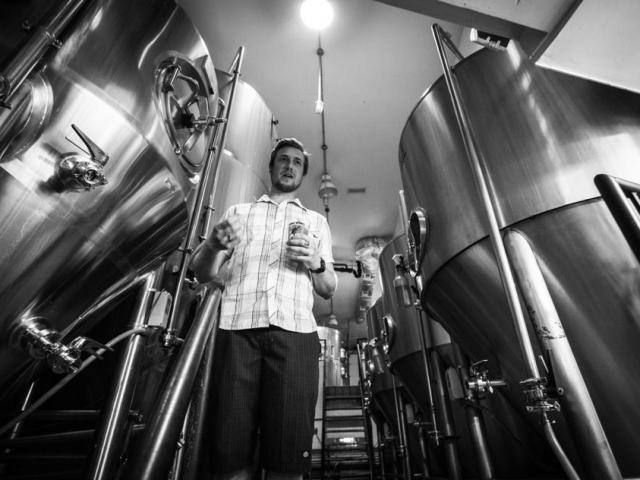Brewing A Dunkelweizen With Revolution's Matt Voelker
By Ben Kramer in Food on Mar 15, 2015 7:00PM

Photo courtesy Matt Voelker
Beer is its own reward. Yet when you put the sweat and effort into creating your own, the reward is even sweeter. When it comes to homebrewing, it’s fun to experiment and try styles you haven’t attempted before. Maybe some of you have tried this style, maybe some of you haven’t. For this post we’re going to look into the Dunkelweizen, a darker version of a hefeweizen. With the help of Matt Voelker, a brewer at Revolution’s Brewpub, we’re going to examine the malts, hops, mashing temperatures and fermentation that this beer requires, along with Voelker's own recipe.
It should be mentioned this recipe is for an all-grain 5 gallon batch. Because it’s all-grain there are some steps you will have to do that are not associated with extract brewing. You will have to mash the grains, lauter and sparge before adding your hops. For more information on all-grain batches, here’s a link to John Palmer's insightful book How To Brew. Before you begin, make sure you are clean! Dirty equipment will lead to off flavors and bad beer.
Now, getting back to the Dunkelweizen. As mentioned, this is a darker version of a Hefeweizen. That means the beer requires a grain bill with at least 50% wheat, as told by German law. Voelker uses 52% in his recipe: 50% red wheat (malted) because it adds to the beer's color, and 2% midnight wheat because, “It gives you the color and it gives you a little bit of roast.” Also, a strong wheat bill will give you greater head retention.
To balance out the malts, Voelker adds 24% Munich and 24% Pilsner to “fortify (the beer) with something that’s going to give you a lot of fermentable sugars on top of (the wheat).”
When it comes to mashing the grains, Voelker suggests keeping the temperature around 153-154 degrees Fahrenheit; 158 is the absolute highest it can go. If you go past that, Voelker says, “You won’t get any fermentable sugars.” Basically, you won’t be able to get any fermentation.
Hopwise, Voelker likes to keep it traditional. Because this is a German beer, he uses German hops. His boil time is 75 minutes, and once the wort starts boiling, he adds 0.3 or 0.5 oz of German Magnum for bittering. Thirty minutes from the End of Boil (or 45 minutes into the boil) he puts in an ounce each of Hallertau and Czech Saaz. For the End of Boil, he finishes with 1 to 1.5 oz of Hallertau and Saaz again. Voelker feels the spiciness of the Hallertau and Saaz plays well with the banana/clove flavors from the yeast. Speaking of the yeast, a Hefeweizen yeast should be used. You can try strains from either White Labs or Wyeast. Be sure to read the descriptions because some yeasts produce more banana flavors/aromas than clove, and vice versa.
The fermentation temperature should be around 70 degrees (though fermenting around 72 will give you more banana character), and should be held in a 6 gallon carboy. This is the primary fermentation, and continues for 7 days. After that, you should transfer it to a 5 gallon carboy because it moves the beer away from the gunk or “yeast cake,” which, if held in there too long, can create “nasty flavors...that you can’t get rid of,” according to Voelker. Make sure the 5 gallon carboy, or secondary fermentation, is kept at around 32 degrees to “crash” the beer. “Crashing” allows unwanted proteins, hop particles and grain particles to fall out and makes for a better beer. After letting it sit for 14 days, you can get to bottling. Let the bottles sit for 2.5 weeks.
You can skip the carboy transfer, and bottling, if you decide to keg your beer and force carbonate it. It’s got to be kept at around freezing, but for only a day or two. After that you can start serving your beer, but don’t serve the first pours. They won’t look so good, and it may take a couple of glasses until your “Best Pour.”
And there you have it! We’ve just done a very basic breakdown of what goes into making a Dunkelweizen. Below is the complete recipe for Matt Voelker's Dunkelweizen Recipe.
All Grain
5 gallon batch
Boil Time: 75 minutes
50% Red (or white, not a big deal) wheat (malted!)
24% Pilsner
24% Light Munich
2% Midnight wheat (if you can't find it sub 1% chocolate malt and add 1% of Munich or pils)
(Mash Temp for malts 153-154 degrees Fahrenheit)
1/3 - 1/2 oz German Magnum @ Start of Boil (SOB)
1 oz each Czech Saaz, Hallertau @ 30min from End of Boil (EOB)
1 - 1.5 oz each Saaz & Hallertau @ EOB
Yeast: Hefeweizen (White Labs or Wyeast)
Primary Fermentation: 70 degrees in 6 gallon carboy for 7 days
Secondary Fermentation: At or just above 32 degrees for 14 days in 5 gallon carboy. Day or two in keg (optional).
Bottling: 2.5 weeks